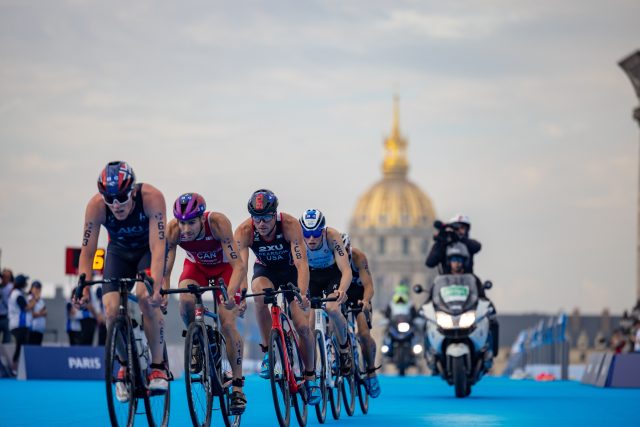
Morgan Pearson was on the way back to his hotel in Paris, France.
He is one of the top triathletes in the world and has taken home podium hardware from multiple international races, including a silver team medal in the 2020 Summer Olympics. He had just gotten out of a swim workout.
It’s the eve of a 2024 Summer Olympics qualifying race called the World Triathlon Olympic Games Test Event Paris. Despite his success, Pearson isn’t planning on lacing up his shoes the next morning. Various injuries and health issues over the previous year and a half meant he wasn’t finishing fast enough to make it on the start list. In fact, he’s third on the waitlist.
Regardless, he wanted to return to the Olympics next summer and thought he had a chance to compete in the qualifier. So he rolled the dice and went to Paris for the qualifier.
“It was kind of tough to go out there and be there and not know if I was going to race or not,” he says.
On the evening before the race, Pearson was losing hope. But then he entered his room and saw a text on his phone: Three people had dropped out.
Fourteen hours before start time, Pearson was in.
“I got really lucky,” he says. “I was the last guy in the race.”
After swimming, biking and running for nearly two hours through The City of Light the next day, Pearson successfully qualified for next summer’s Olympic Games. Now, the athlete with CU Boulder roots is gearing up on the Front Range this winter for another run at the Olympic podium with high aspirations.
“If I can run what I think I can run,” he says, “I think it’ll be very hard to beat me.”
‘That was for them’
Pearson grew up in New Jersey, but made his way to CU Boulder in 2012 to join the cross country and track team. Along with helping his cross country team win two national titles and multiple Pac-12 championships, he also took home a few All-American honors.
Pearson fondly remembers his stint in Boulder, even aside from his running success — it was a special time with some of his closest friends. And as a Division 1 runner, there are few things more valuable than a high-calorie meal following a difficult workout. He recalls fueling up with his teammates at a familiar burrito institution.
“We loved Illegal Pete’s on The Hill,” he says.
It wasn’t until a year after college that Pearson started to explore triathlons — something he thought he might be naturally competitive at, given his running experience and growing up working as a lifeguard and competing in some open-water swims. Plus, he wanted to go to the 2020 Olympics.
“You can’t just have that idea in your mind of, ‘Maybe I can be pretty good at this,’ but never never actually do it,” he says. “I decided that I was going to do it.”
A triathlon is a fiercely physical competition that includes a 1.5 km swim (.93 mile), 40 km bike (24.8 mile) and 10 km (6.2 mile) run. The top women finish in about two hours. The men are typically around 10 minutes earlier.
Pearson first tested the waters in the summer of 2017 at an age group nationals competition in Nebraska. After not training because he wanted to see his raw talent for the sport, he won it.
Pearson saw potential to compete on an even bigger stage.
“I’ve always been kind of drawn to the idea of being the best in the world at something,” he says.
Qualifying for a second Olympics is a dream come true for Pearson. But it was a special moment for him in more ways than one.
Shortly before qualifying for the 2020 Olympics, Pearson’s older brother died unexpectedly. The tragedy hit hard: Pearson took a month off from training and went home to New Jersey to grieve with his family.
When he was ready, he found getting back into exercising to be therapeutic.
“You’re with your family, and it’s just talking, crying and a lot of emotion. And that’s good; you need to go through that,” he says. “Being able to get outside by myself and just bike or run or go swimming was kind of like that release.”
Pearson experienced complex emotions when he qualified for Tokyo because of those circumstances.
“Ten weeks after your brother dies unexpectedly, you achieve a lifelong goal,” he says. “There’s happiness, but it’s, like, not happiness. It was such a strong emotion that I felt.”
He says those feelings came back to the surface after his Olympic-qualifying performance this summer in Paris. That day, it was about more than just him.
“I’m an athlete; it’s a somewhat selfish pursuit. But that day when I qualified, it was for my family,” he says. “That was for them — to give them hope and happiness.”
Spectators weren’t allowed at the last summer Olympics because of COVID-19 restrictions. Next summer’s Olympics should be back to normal, and Pearson is excited for his family to share the experience with him.
The next time he’s in Paris, Pearson will have more than 14 hours to prepare, unlike for the qualifier, before diving into the race. He’s already started mending injuries and building up the volume of his training. Right now, his weekly routine includes biking 14 hours a week, running 60 miles a week, swimming just about every day and sprinkling in physical therapy and massages.
“I know how to train hard,” he says. “And it’s just about execution in the training and the execution on race day.”














